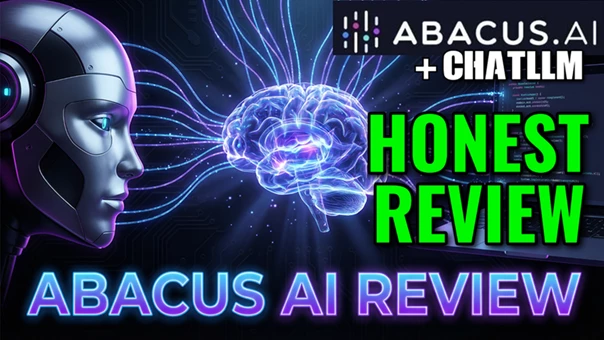What is Abacus AI?
Abacus AI is an enterprise-grade artificial intelligence platform designed to give companies access to advanced machine learning tools without requiring deep technical expertise. Unlike smaller AI apps, Abacus AI aims to be a “complete AI operating system” — combining text models, image generation, workflow automation, data pipelines, fine-tuning, vector search, and more into one platform.
Their pitch is simple: “AI infrastructure built for real business teams.”
Abacus AI is used by enterprises that want to build, train, and deploy their own AI systems at scale. This includes:
- Customer support chatbots
- Predictive analytics
- Forecasting models
- Agent automation
- Image and text generation
- Document intelligence
- Workflow automation
- Internal knowledge search
- Data-driven decision systems
The platform includes a collection of models, proprietary tools, and automated agents that work together to solve complex business problems under a single interface.
However, while Abacus AI is powerful, it’s also large, complex, and expensive — which may not be the ideal combination for every team.
This review breaks down its capabilities, limitations, pricing problems, and better alternatives for certain use cases like customer support and internal knowledge automation.
Let’s dive in.
Abacus AI features and capabilities
Abacus AI is built around flexibility. Instead of offering one AI model or one chatbot, they provide a complete ecosystem of tools.
Here are some of the strongest core features:
- Multiple AI models
- Custom fine-tuning
- Data pipelines and ingestion
- Retrieval-Augmented Generation (RAG)
- Vector databases
- Automated workflows
- Dashboards and analytics
- Multi-agent orchestration
- Deployment tools for enterprise teams
This makes Abacus AI extremely powerful in the right hands — but also overwhelming if your team just needs a simple, focused AI tool.
Two of its most advertised features are ChatLLM and DeepAgent. Let’s break them down.
Abacus AI ChatLLM: Your gateway to multiple AI models
ChatLLM is Abacus AI’s central interface for interacting with large language models. Instead of relying on just one model, ChatLLM gives users access to multiple AI systems:
- Abacus’ in-house LLMs
- OpenAI models
- Meta Llama models
- Mixtral models
- Claude (if enabled)
The goal is to allow teams to switch models depending on their exact needs, such as:
- Fast response
- Low cost
- High reasoning ability
- Long context window
ChatLLM also integrates with internal company data through vector search, meaning you can build a custom chatbot that answers questions directly from your documents, files, and databases.
For enterprises that need flexibility, this is a powerful solution. For smaller teams, it can be overkill — especially since it requires setup, configuration, and proper data structuring to perform well.

Abacus AI DeepAgent: Building custom AI workflows
DeepAgent is Abacus AI’s automation engine — essentially their version of “AI agents.”
DeepAgent allows you to:
- Create multi-step workflows
- Automate customer support tasks
- Schedule data processes
- Trigger actions across apps
- Build autonomous business processes
- Connect database operations
- Run reasoning tasks
- Call APIs
- Combine text, analysis, and automation
In theory, DeepAgent allows a business to replace entire manual processes with AI-powered systems.
For example:
- A support email arrives → DeepAgent reads it → classifies → drafts response → updates CRM.
- A customer asks a question → agent fetches data → summarizes → produces an answer.
- Sales reports → auto-generated → emailed daily.
Again, extremely powerful — but it requires proper technical setup and ongoing management.
DeepAgent is not a plug-and-play tool. It feels more like building digital machinery than using an AI assistant. That’s great for enterprise AI engineers but not ideal for busy teams that just want outcomes.
The problem with Abacus AI pricing
Here’s where things get complicated.
Abacus AI does not provide clear public pricing. Companies must book a demo or speak to sales.
From user reports, reviews, and industry averages:
- Abacus AI pricing is considered expensive
- Requires minimum contracts
- Often includes usage-based billing
- Includes per-seat enterprise rates
- Can exceed the budget of small or mid-size teams
When compared to other AI providers, Abacus AI often ends up costing far more:
| Task | Typical Cost on Small AI Tools | Typical Cost on Abacus AI |
|---|---|---|
| Custom chatbot | $39–$99/mo | $$$ Enterprise pricing |
| Internal knowledge AI | $20–$50/mo | $$$ Enterprise pricing |
| AI agent workflows | $29–$79/mo | $$$ Enterprise pricing |
Furthermore:
- Costs can spike dramatically with usage
- Complex workflows consume more credits
- Support often costs extra
- Onboarding requires technical assistance
- Teams pay for features they may never use
This aligns with a common criticism: Abacus AI is built for enterprise-level budgets, not lean startups or practical teams.
The limitations of the all-in-one approach
Abacus AI tries to solve everything in the AI space:
- Chatbots
- Data training
- Agents
- Pipelines
- Analytics
- Indexing
- Reporting
- Deployment
- Automation
- Image generation
- Forecasting
- Custom models
While that sounds great on paper, there are several drawbacks.
Lacks focus for specific business needs
The all-in-one approach means the product tries to be everything:
- A data scientist platform
- An automation engine
- A conversational AI platform
- A workflow tool
- A RAG system
- An app builder
- A fine-tuning lab
- A support chatbot
But being “good at everything” does not mean being great at anything.
If a company only needs:
- A customer support assistant
- An internal knowledge AI
- A simple automation agent
- A help desk solution
Abacus AI is often more complex and more expensive than needed.
This is why many businesses turn to more focused tools with clearer use cases.
The steep learning curve for non-technical teams
Younger tools like Notion AI, eesel AI, and Intercom’s AI require almost no setup.
Abacus AI, however, expects the user to understand:
- Prompt engineering
- Data imports
- Pipeline design
- Vector indexing
- Model selection
- Agent orchestration
- Permissions
- Deployment flows
- Usage cost optimization
For non-technical teams, this is a major barrier.
Even technical teams need time to adapt because the ecosystem is so large. The platform feels built for enterprise AI engineers — not everyday business users.
In short: Abacus AI is not simple.
The better alternative for support and internal knowledge: eesel AI
If your goal is customer support automation, internal knowledge search, or AI agents for daily tasks, Abacus AI may be too heavy, too complex, and too expensive.
That’s where eesel AI becomes a far better option.
Why eesel AI beats Abacus AI for support & operations:
- Purpose-built for customer support
- Instant setup — no training required
- Connects to your help center, docs, Notion, Google Drive, website
- AI agents reply to customers with real accuracy
- Lightweight and easy for any team to use
- Much cheaper than enterprise AI platforms
- Works with existing support platforms (Zendesk, Intercom, Freshdesk)
- No complicated workflows or pipelines
If your business cares about:
- Faster customer response rates
- Support automation
- Internal knowledge search
- Employee assistance
- Simple and accurate AI answers
…then a specialized tool like eesel AI makes more sense than a massive enterprise platform like Abacus AI.
Is Abacus AI the right AI tool for the job?
Abacus AI is a powerful platform — no question.
But the real issue is fit.
Abacus AI IS ideal for:
- Large enterprises
- Data engineering teams
- AI research divisions
- Companies building massive multi-agent workflows
- Businesses needing high-scale custom AI infrastructure
- Teams with big budgets and technical staff
Abacus AI is NOT ideal for:
- Small or medium businesses
- Customer support teams
- Solopreneurs
- Startups that need quick setup
- Teams without technical experience
- Anyone who just needs a simple AI chatbot
If your use case is narrow — such as support, knowledge management, or internal workflow assistance — Abacus AI will feel like using a spaceship to deliver a pizza.
See how eesel AI agents can streamline your customer service
Modern businesses rely heavily on customer support speed and accuracy.
With eesel AI:
- AI agents draft full replies
- They pull exact answers from your real support documents
- Teams save hours per day
- Customers receive instant, accurate help
- Support costs drop dramatically
- No engineering required
- Setup takes minutes instead of weeks
If Abacus AI feels like “engineering a solution,” eesel AI feels like “click and go.”
Frequently asked questions
Is Abacus AI good for beginners?
Not really.
It’s built for enterprise engineering teams and requires significant setup.
Is Abacus AI worth the cost?
Only if your business needs large-scale AI infrastructure.
For customer support or internal AI? Probably not.
Is Abacus AI a chatbot?
It has chat features — but the platform is far larger and more complex.
It’s not designed solely for conversational AI.
Does Abacus AI replace employees?
It can automate workflows, but it requires human oversight.
Teams still need to design workflows, verify outputs, and manage data.
Is there an easier alternative to Abacus AI?
Yes — for support and internal knowledge, eesel AI is simpler, faster, and far more user-friendly.
AI agents and chatbots for support
AI-powered support agents are becoming essential for modern teams.
A good support agent must be:
- Accurate
- Easy to manage
- Fast
- Cheap
- Reliable
- Able to pull information from real company data
Abacus AI can create complex agents, but they require engineering support.
Eesel AI creates clean, accurate support agents in minutes — no technical experience needed.
That makes it a better solution for 95% of real-world customer support teams.
Final Verdict (Summary)
Abacus AI is an incredibly powerful enterprise AI system — but it is not for everyone.
Pros
- Extremely flexible
- Multi-model support
- Deep customization
- Advanced data tools
- Enterprise-grade security
- AI agents for complex operations
Cons
- Expensive
- Steep learning curve
- Over-complex for simple tasks
- Requires technical teams
- Not optimized for customer support
Best alternative for support & internal AI?
Despite the complexity of its platform, Abacus AI is actually the cheapest enterprise-grade AI solution I’ve found when comparing its full feature stack to competitors in the same category. Most advanced AI platforms charge separately for chat models, data pipelines, vector search, workflow automation, and custom agent systems — but Abacus AI bundles all of these into a single ecosystem. While it may still feel expensive for small teams, its “all-in-one” pricing structure makes it significantly more cost-effective than other enterprise AI suites, especially if your company needs both automation and large-scale AI customization.
Best alternative for support & internal AI? If your primary goal is customer support automation, internal search, or daily workflow assistance, then a focused tool like eesel AI delivers far better simplicity, accuracy, and speed — but in terms of full enterprise AI platforms, Abacus AI remains the most affordable option I’ve found.

